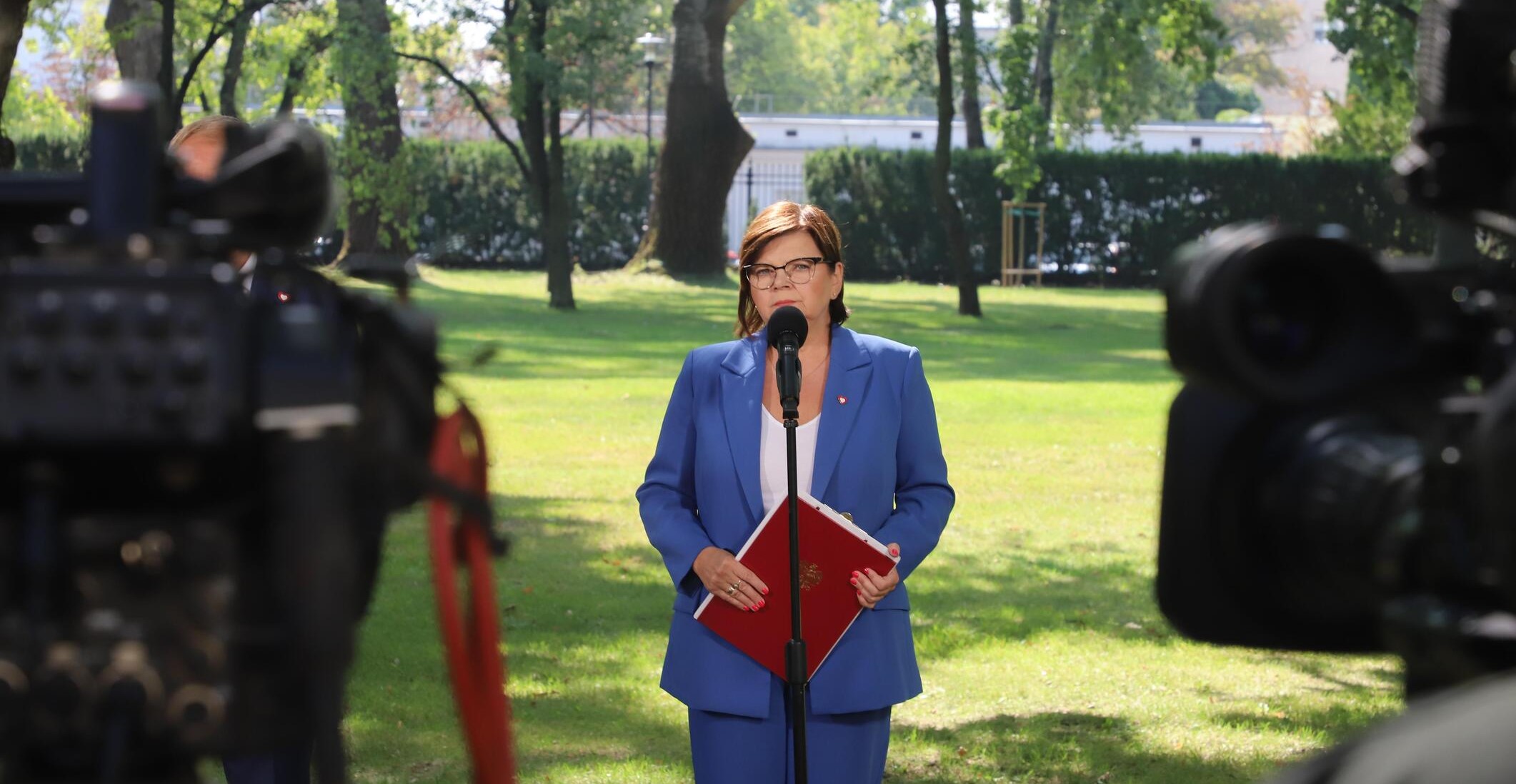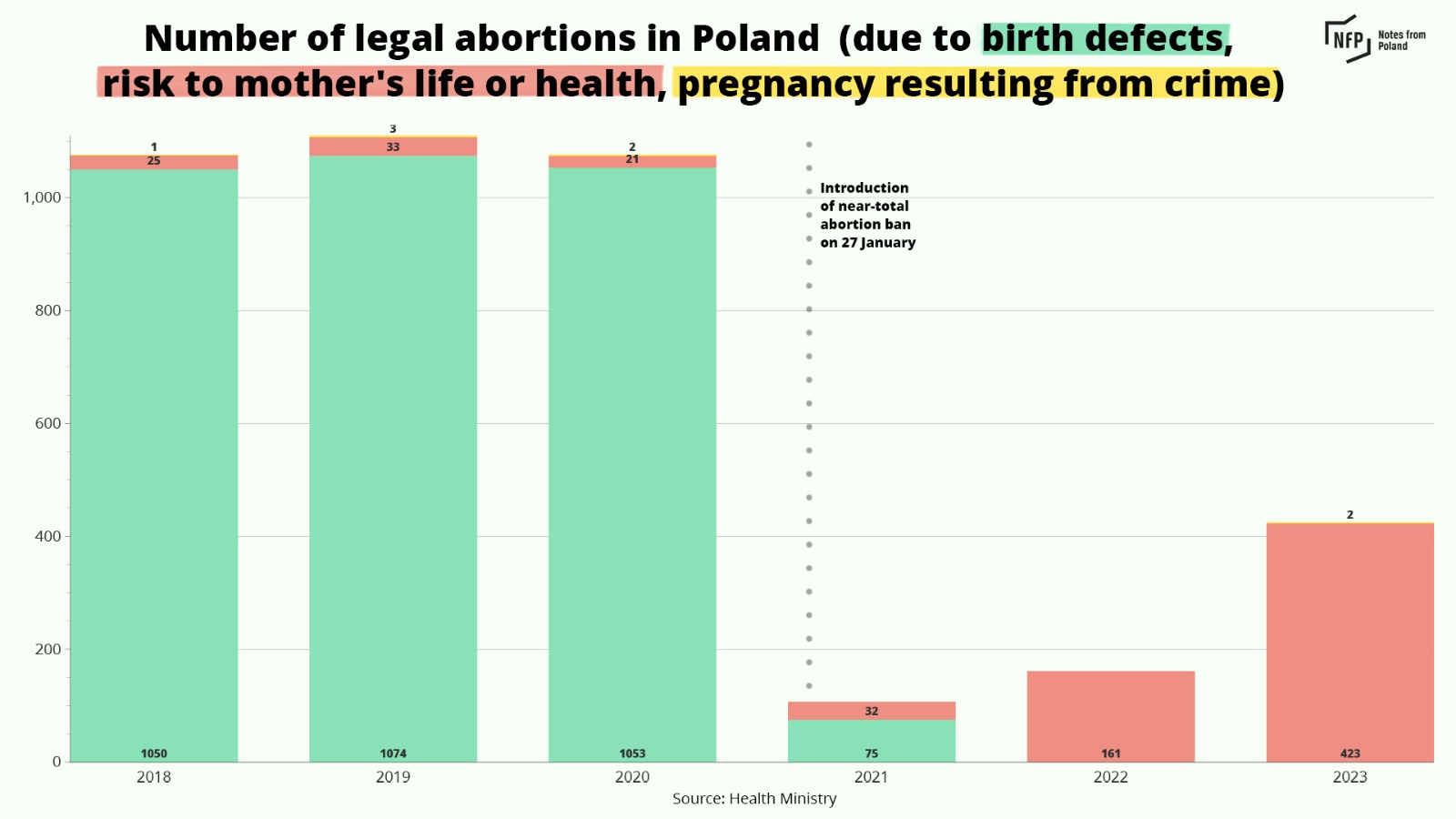Polish government publishes guidelines to help women obtain legal abortions

Poland’s government has published guidelines for when and how abortions can be carried out, with the aim of ensuring that doctors and prosecutors “take the women’s side” when making decisions on the issue.
Prime Minister Donald Tusk – who last week admitted that it is unlikely he can achieve his aim of liberalising the country’s strict abortion law – declared today that “if we won’t change the law, we will change the reality”.
“We are looking for ways of acting that, in accordance with the law, will enable in practice access to legal abortion for women who, for various reasons, should have the right to this abortion,” he added.
✅ Wprowadzamy wytyczne, które w praktyce umożliwią dostęp do legalnej aborcji z powodów zdrowotnych. pic.twitter.com/HQMCvRKU0A
— Kancelaria Premiera (@PremierRP) August 30, 2024
Under Poland’s current abortion regime – which is stricter than in any European country other than Malta – abortion is only allowed in one of two circumstances: if pregnancy results from a criminal act (such as rape or incest); or if it threatens the life or health of the mother.
After Poland’s current near-total abortion ban was introduced in 2021, the number of legal terminations fell dramatically. Only 107 were carried out that year (most of them before the ban went into force in late January) compared to over 1,000 in 2020. However, last year the figure rose to 423.
When Tusk’s coalition came to power in December last year, it pledged to liberalise the abortion law. However, the prime minister admitted last week that he is unable to find agreement between more conservative and liberal elements of the ruling camp on what form the new abortion law should take.
As such, the health ministry has sought to find non-legislative solutions to make it easier for women to access abortion. For several months, it has been working on new guidelines for hospitals and doctors regarding when and how pregnancies can be terminated, and those were finally published on Friday.
Sorry to interrupt your reading. The article continues below.
Notes from Poland is run by a small editorial team and published by an independent, non-profit foundation that is funded through donations from our readers. We cannot do what we do without your support.
The document notes that when the law talks of a “threat to the mother’s health” as justification for abortion, it does not specify “which area of health this concerns” nor that the threat must be “sudden or imminent”. Thus doctors should take into account all aspects of physical and mental health.
“If a woman goes to, for example, a psychiatrist and they consider that there is a threat to mental health, the certificate issued by them is sufficient to terminate the pregnancy,” said health minister Izabela Leszczyna while presenting the new guidelines alongside Tusk and justice minister Adam Bodnar.
Some hospitals and doctors have been reluctant to terminate pregnancies if they threaten a mother’s mental health. Last year, Poland’s Catholic church declared that abortions should not be allowed on such grounds, as this would effectively mean “legalisation of abortion on demand”.
A UN committee has published a report looking into possible human rights violations due to Poland’s strict abortion law.
It found that the situation for women seeking abortion in Poland may constitute „torture or cruel, inhuman or degrading treatment”.https://t.co/4afA1bdnmi
— Notes from Poland 🇵🇱 (@notesfrompoland) August 27, 2024
The health ministry’s new guidelines also emphasise that the opinion of a single qualified medical expert in the relevant field is enough to justify an abortion. Hospitals should not “make the possibility of terminating a pregnancy conditional on obtaining additional medical certificates or opinions”.
Women’s rights groups have complained that hospitals often make such demands, which represents a further obstacle to obtaining legal and justified abortions.
The guidelines remind doctors that they have an obligation to keep patients “informed about the possible solutions” to any threats to their life or health, “including the permissibility of terminating the pregnancy”. They also note that abortions are a service that must be provided under public health insurance.
Thousands joined protests against Poland’s near-total abortion ban yesterday following the latest death of a pregnant woman in hospital.
But the conservative authorities say the tragedy was caused by medical malpractice, not the abortion law https://t.co/dJFJn6O1Y4
— Notes from Poland 🇵🇱 (@notesfrompoland) June 15, 2023
The guidelines also refer to the so-called “conscience clause“, under which doctors are permitted not to provide treatment if it conflicts with their beliefs. That is often used by Catholic physicians to refuse to provide treatments such as abortion or birth control.
The document notes that the clause does not apply if a delay in providing treatment would endanger a patient’s health. It also clarifies that the conscience clause only applies to individual doctors and cannot be used to prevent an entire medical facility from offering abortions.
Facilities that receive public funding to provide medical services can be fined up to 2% of the value of their contract with the National Health Fund (NFZ) if they fail to provide such services. They can also be fined up to 500,000 zloty by the commissioner for patients’ rights.
A hospital has been fined for refusing to provide an abortion in the first such case since the government introduced a requirement for publicly funded healthcare providers to offer such procedures https://t.co/rhSmn932Zm
— Notes from Poland 🇵🇱 (@notesfrompoland) June 18, 2024
Leszczyna said that the purpose of producing the guidelines was, above all, to protect the health of pregnant women. But they are also intended to “ensure legal security for doctors who will apply these guidelines”.
Speaking alongside her, Bodnar, who as well as being justice minister is also prosecutor general, said that prosecutors should “pay special attention to the situation of a woman who is in this difficult moment in life and apply the provisions of law that are still in force [in a manner] so as not to lead to any additional victimisation”.
Earlier this month, Bodnar’s office published its own guidelines for prosecutors dealing with cases relating to abortion.
“These guidelines cannot change the law, but they change the attitude of prosecutors and doctors,” added Tusk. “Doctors will feel that when they take the woman’s side, prosecutors will also take the woman’s side.”
🎥 Te wytyczne nie mogą zmienić przepisów prawa, ale zmieniają nastawienie prokuratury i lekarzy. Lekarze będą czuli, że kiedy staną po stronie kobiety, to prokuratura będzie także po stronie kobiety – Premier @DonaldTusk. pic.twitter.com/Yaj6jfKVQA
— Kancelaria Premiera (@PremierRP) August 30, 2024
The government’s actions were welcomed by one leading reproductive rights group, Federa, which thanked the health ministry for “showing that you are on the side of the women”.
However, another group, Aborcyjny Dream Team, said that the guidelines are unlikely to have any real effect as they just repeat previous recommendations on how to interpret the law and do not introduce necessary improvements to the provision of reproductive healthcare.
Meanwhile, an MP from Poland’s conservative opposition, Michał Woś, condemned Tusk, Leszczyna and Bodnar as “sowers of death” whose “illegal” guidelines will “introduce abortion of healthy children”.

Main image credit: Ministerstwo Zdrowia (under CC BY-NC-ND 3.0 PL)

Daniel Tilles is editor-in-chief of Notes from Poland. He has written on Polish affairs for a wide range of publications, including Foreign Policy, POLITICO Europe, EUobserver and Dziennik Gazeta Prawna.






